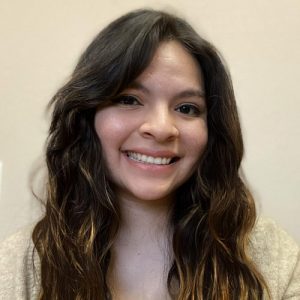
Introducing Dr. Kitzia Moreno-Garza: Her Identity Story
Dr. Kitzia Moreno-Garza is our BIPOC Fellow for 2023–2024, working closely with Senior Research Associate Nabil Tueme to understand how race and culture impact Gen Z’s transition into adulthood and how Gen Z makes sense of their identities. Below, she reveals how her identities inform her beliefs.
Nepantleras are the supreme border crossers. They act as intermediaries between cultures and their various versions of reality. Nepantleras, like the ancient chamanas, circumvent polarizing binaries. They try not to get locked into one perspective or perception of things. They can see through our cultural conditioning and through our respective cultures’ toxic ways of life. They try to overturn the destructive perceptions of the world that we’ve been taught by our various cultures. They change the stories about who we are and about our behavior. They point to the stick we beat ourselves with so we realize what we’re doing and may choose to throw away the stick. They possess the gift of vision. Nepantleras think in terms of the planet, not just their own racial group, the US, or Norte America. ¹
—Gloria E. Anzaldúa
I often think about the concept of nepantla in my work and life. Birthed from Nahuatl language and conceptualized in Chicano anthropology, nepantla represents the “in-between-ness” of existing between cultures, languages, norms, and expectations. Seeking the balance between my American upbringing and my Mexican heritage pushed me to reflect on how my identities shape my life and perspective. As the daughter of immigrant parents, I witnessed firsthand the
disparities in my underserved community and the effects of broken mental-health systems. I also witnessed the power of growing up in a community full of people who reflected my identities, serenaded by a community full of music, dance, and the Spanish language in every store. I grew up mesmerized by how my neighborhood could do so much with so little. As I entered college and began gathering glimpses of my peers’ world, I felt othered because until this point, I had assumed the experience of growing up wrapped in the daily struggle of systemic oppression was normal, and here I was learning it was not.
My initial reaction to that realization was to shrink. I was wading through a world that felt whiter, wealthier, and less familiar. I went to great lengths to conform and contain. I followed Western customs of pleasantry, Americanized my name, and adopted interests that were foreign to my upbringing. I concealed my history and heritage, which was unlike anyone else’s in the room. I felt compelled to erase its existence, almost as if denying my own roots was the price I had to pay for acceptance. The longer I engaged in this painful battle between the person I was and the person I thought I needed to become, the more disconnected I felt from others, from my culture, from my community, and from myself. I also realized that when I noticed my discomfort from hiding parts of who I was, I felt shame rise within me. I wanted to confront that shame and heal it. Exploring my heritage allowed me to view my so-called “flaws” as opportunities for growth and self-acceptance, leading to a more authentic sense of who I am and where I belong. I learned that even if my entire community did not have the privilege to be in these spaces, I could work to be their voice so they would not have to be silenced by omission. While the weight of that responsibility can feel heavy, when I continue to maintain connection to my community, we carry that weight together.
Raised on diligence and humility, my mother inspired my commitment to change and service. I learned to embrace the power of biculturalism and bilingualism. With the multiple identities I hold as a queer Latina, I embrace how my identities influence my research. My exploration into Latinidad highlighted for me how closely colonization and Catholicism are embedded into Mexican culture, even for those who do not identify as religious. At Springtide, I have been able to pursue research that helps us further gain insight into the intersections of spirituality, religion, and human life. Like a needle on a thread, I aspire to weave together the parts and pieces of minoritized people’s experiences that are not often at the forefront of mainstream research to create a quilt that can actually be viewed and used by those who make up its stitching.

Dr. Kitzia Moreno-Garza
BIPOC Research Fellow
Endnote
1. Anzaldúa, G. E., Ortiz, S. J., Hernández-Avila, I., & Perez, D. “Speaking Across the Divide” in Studies in American Indian Literatures, Vol. 15, Nos. 3–4 (University of Nebraska Press, 2003), 7–22, http://www.jstor.org/stable/20737212.



